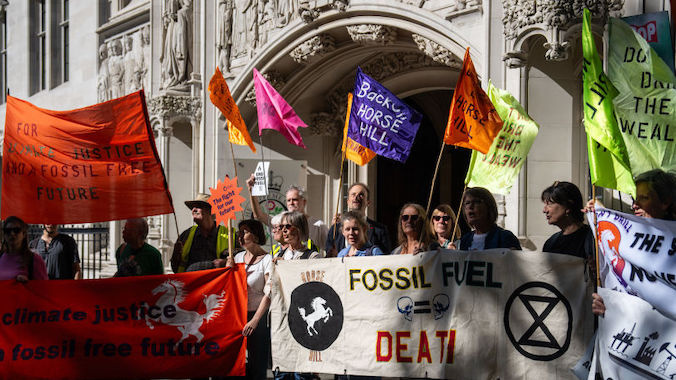Did the U.K. Supreme Court Kill the Country’s Fossil Fuel Industry?
Photo by Carl Court/Getty Images
In a landmark 3-2 decision, the United Kingdom’s Supreme Court ruled that the downstream emissions of fossil fuel extraction projects must be considered in the approvals process. This is, in short, a big deal.
“The landscape around the granting of planning permission for fossil fuel extraction has been fundamentally changed.” That’s the conclusion of Friends of the Earth U.K., which supported the legal challenge behind the Horse Hill case, in which petitioners claimed that the Surrey County Council failed to consider the emissions from the inevitable burning of fossil fuels when granting permission for 20 years of oil drilling. The Court agreed.
“[T]he council’s failure to assess the effect on climate of the combustion of the oil that would be produced from the proposed well site means that its decision to grant planning permission for the project was unlawful,” the Court held. In a lengthy decision, the Court noted that the initial estimate of direct greenhouse gas emissions form the oil drilling project at Horse Hill — about 141,000 metric tons — was considered to have a “negligible” effect on the climate. If the emissions from the actual use of the oil, largely for transport, were considered, “the figure for GHG emissions attributable to the project would have been nearly two orders of magnitude greater and could not have been dismissed as ‘negligible’ in that way.”
The ruling will likely have implications for currently proposed fossil fuel projects that are facing their own legal challenges, including a coal mine in Cumbria and drilling projects at the Rosebank and Jackdaw oil fields in the North Sea.
“Gas, oil and coal companies have been fighting tooth and nail to avoid having to account for all the climate-harming emissions their developments cause,” said Friends of the Earth lawyer Katie de Kauwe in a press release. “This historic ruling is a watershed moment in the fight to stop further fossil fuel extraction projects in the UK and make the emissions cuts needed to meet crucial climate targets.”
Like many countries, the U.K. has set a mid-century net-zero target, and while it has made substantial progress, there are still gaps. Its continued issuing of fossil fuel permits is, according to the statutorily created Climate Change Committee, “not in line with Net Zero.” And Climate Action Tracker says its progress and policy so far is “insufficient” to meet global emissions targets, lumping it in with other rich laggards like Australia, Japan, and, notably, the U.S.
“This judgment will make it harder for new fossil fuel projects to go ahead,” de Kauwe said. “They can no longer claim that downstream emissions are someone else’s problem.”